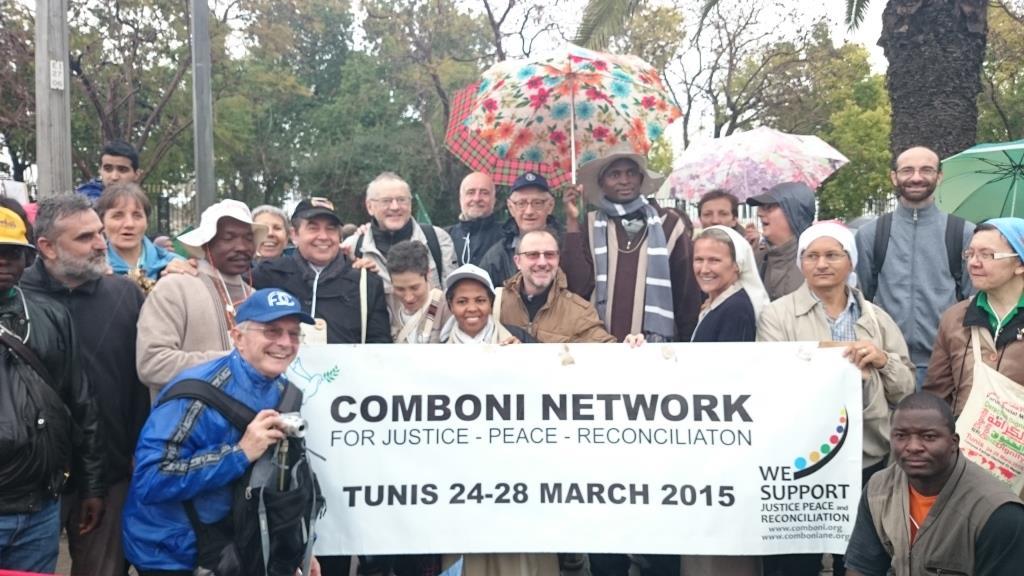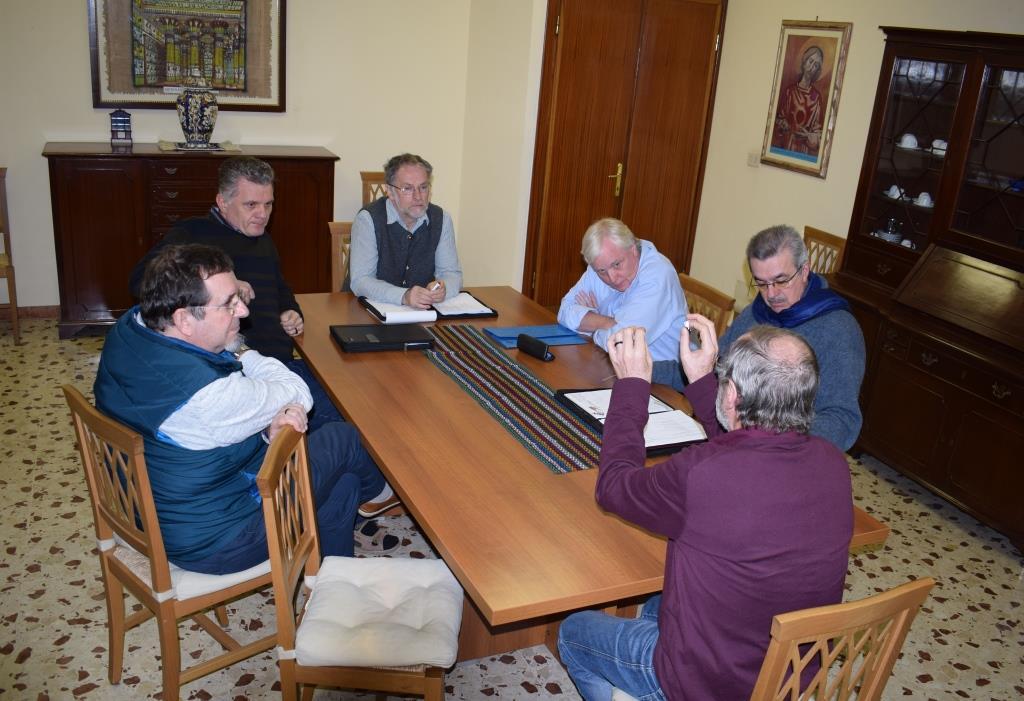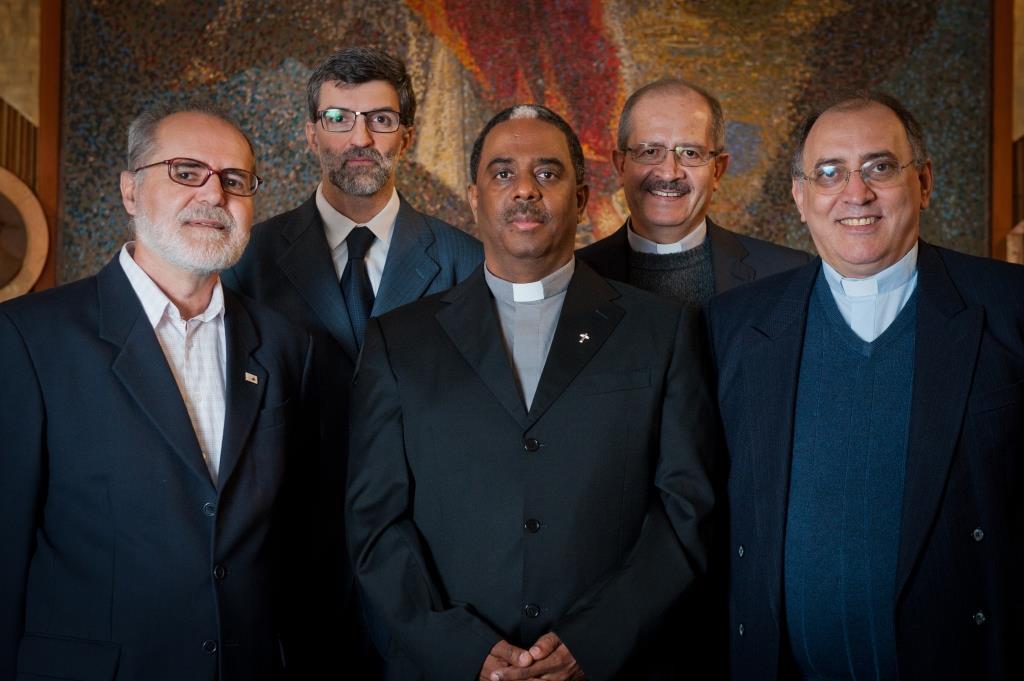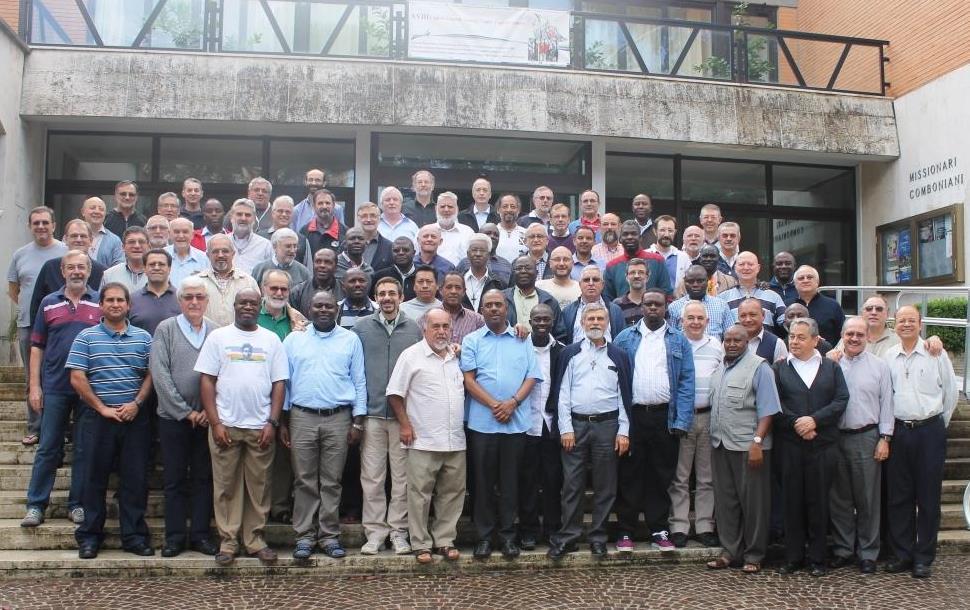Daniel Comboni
Comboni Missionaries
Institutional area
Other links
Newsletter
Tuesday, July 7, 2015
“It is important that the Chapter and the new General Administration reaffirm explicitly our commitment to Justice, Peace, Integrity of Creation and Reconciliation as an urgent task in the world of today, and as an intrinsic dimension of our missionary presence. But concrete signs and precise choices are needed in order for this priority to be assumed effectively by each province and community”, so proposes a group of 74 Comboni missionaries in an open letter to the XVIII General Chapter of the Comboni Missionaries.
Comboni Missionaries: Pilgrims in search of regeneration for the world
Open Letter to the Chapter of the Comboni Missionaries 2015
“That they may have life, and have it to the full” (Jn 10: 10)
As Comboni Missionaries, we are invited to defend life in today’s society that is undergoing a deep spiritual crisis. A society that is losing hope and emptying human life of its profound meaning. A society that rejects many of its members and puts at risk the life of the future generations.
God’s dream is that we all live in the dignity and freedom of daughters and sons, sisters and brothers, sharing in the benefits of his Kingdom. This is the mission to which we are called and which warms our heart while we make memory of our vocation, always walking with that virtue that is proper to the pilgrims: joy!
The commitment of Saint Daniel Comboni against the slavery of his own time remains a valid key for reading the modern world. The slavery of the world today is a clear sign of the crisis of values in society and at the same time the bitter fruit of an unjust world. Slavery today goes under different names, according to the different contexts: slavery of the indebtedness, forced labour, sexual exploitation, forced early marriage, rituals and religious discrimination. It has the faces of exploited children in the carpet industry; of underpaid migrants working in the agricultural fields in the South of Italy; of young girls working in the industries at the Mexican borders; of the families evicted from their land by multinational agricultural companies. And many other faces and stories of this world.
Together with God, we listen to the cry of the poor, the excluded, the rejected, the slaves (EG 187). We are concerned about their fragility and put at the centre of our transformative action “the dignity of the human person and the common good” (EG 210-218).
Slavery and Comboni Missionaries
Among the many calls to commitment against these different slaveries, the intuition and practice of the Comboni Missionaries in the recent history of the Institute have given priority to some paths of liberation, practical and interconnected with each other.
Evangelizing the world through defending human rights is, at present, one of the privileged ways today to promote the evangelization of the poorest and most abandoned. We have a long history of involvement in the urban peripheries and slums. Some of us have been involved in reconciliation initiatives in war zones. We have played also a significant role in networks such as AFJN, AEFJN and VIVAT International.
Many of our communities have been daily and actively involved in promoting dialogue among cultures and religions. They take to heart healing the open wounds, produced by the different fundamentalisms or by terrorism, seeking to promote a culture of inclusiveness (EG 186, 255). We think of the many confreres engaged in the ministry of mission promotion, or in education, or in assistance to migrants or in fighting human trafficking.
Journeying together with indigenous people, migrants or ethnic minorities has been another commitment of many of our Comboni communities, at the side of people not only exploited but also considered irrelevant in the context of the social and economic model of today, and therefore excluded or rejected (EG 53). Let us think of the indigenous Afro-American people or the Pastoralists of East Africa or the Pygmies of Congo.
The defence of the integrity of Creation is today a proclamation of the Gospel of Life against slavery: the unjust use of environmental resources that marginalizes people, the greedy exploitation of the common goods that evicts entire communities from their lands, the climate changes which negatively affect millions of people. The Comboni Missionaries are involved also in these fields that Pope Francis frequently considers decisive for the Church. Let us think of the accompaniment of communities in conflict with the mining industry, at the serious work of confreres actively involved against global warming, land-grabbing, and the privatization of water, as well as the significant role played in the Pan Amazonic Ecclesial Network.
Reaffirming priorities and remodelling structures
In spite of all our weaknesses and fragility, we have the impression that we are implementing, at least partially, the intuition of Comboni in defence of the life of the poorest and against slavery. In any case, the challenges of Evangelii Gaudium invite us to make more explicit this charism of ours and remodel our structures so that they do not become an obstacle but rather an incentive to this style of missionary service.
It is important that the Chapter and the new General Administration reaffirm explicitly our commitment to Justice, Peace, Integrity of Creation and Reconciliation as an urgent task in the world of today, and as an intrinsic dimension of our missionary presence. But concrete signs and precise choices are needed in order for this priority to be assumed effectively by each province and community. We propose:
1. To unify the secretariats for Evangelization and Mission Promotion and the Office of Justice and Peace into one Secretariat: the Secretariat for Evangelization. As a consequence this secretariat would become a community of three confreres who discern and work together.
The Provincials during the Inter-Capitular remarked that often the three above-mentioned sectors work each one by itself with the consequence that the mission is understood as if Evangelization were separated from Mission Promotion and JPIC. Unifying the three dimensions it will help us to rethink the mission in a unified manner. Keeping together the three confreres working in this secretariat will surely help us to consider the mission in a unified manner, and will empower the secretariat in its dealing with the General Council and in its work of accompanying the initiatives of the confreres at the grassroots. In several of our provinces the secretariats are already working in this way: some provincial councils have already unified evangelization, social communication, mission promotion, and JPIC into one secretariat, and have found in this secretariat an important instrument at the service of the provincial priorities.
2. To create working groups on specific themes at the level of the Comboni Family (MCCJ, CMS, LMC and Seculars), called “Interprovincial Ministries”. They would facilitate the exchange among the missionaries involved in specific fields and ministry.
The present organization in provinces risks to isolate us from one another. Our missionary commitment is at risk of assuming a “provincial” dimension in the negative sense. On the contrary, the challenges of evangelization and of regeneration from slavery are more and more complex and global, encouraging us to have an approach that goes beyond our local horizon, through networks and wider visions.
We could concentrate on the above-mentioned fields: defence of the human rights, inter-religious dialogue, defence of the integrity of creation. The coordination with the missionaries working with the indigenous and minority people may be easier if it is done at the regional level, because of the specificity of the different cultures.
- The group for the defence of the human rights would have the task to organize and promote the Comboni methodology that in different provinces creates or enters into collaboration with other groups and centres for the defence of the human rights. It may strengthen the links with institutions and networks at international level, especially through AFJN, AEFJN and VIVAT International of which we have been supporting members for a long time.
- The group for inter-religious dialogue initially will focus on the Islamic-Christian dialogue, gathering together the Comboni Missionaries, women and men, who are competent and interested in this issue in Africa and Europe. It may offer reflections and pastoral proposals, in cooperation with other Churches and with the civil society in the provinces in which we minister.
- The group for the Integrity of Creation may stimulate the interaction of the Comboni Missionaries, women and men, on the issues of land grabbing, water and other common goods as well as of climate changes. The group would foster theological reflection on these issues and the diffusion of pastoral instruments in connection with regional and international networks and organisations. It would strengthen, in particular, our participation in the Pan Amazonic Ecclesial Network.
The three groups, each one made up of 5-6 people, members of the Comboni family, would be the operative instrument of the Secretariat for Evangelization, specialized, inserted in their provinces, but connected and communicating among themselves.
3. To progressively decentralize the accompaniment of the provinces at the continental level. The role of the Provincial coordinator of the mission in each continent should be strengthened and the General Councillor responsible for each continent should be allowed to spend more time in the continent, while interacting from a distance with the General Council, and monitoring closely the implementation of the continental missionary priorities, in dialogue with the secretariat of the mission and the provinces, in a spirit of effective collegiality.
4. To include the themes of Justice, Peace, Reconciliation and Integrity of Creation in the programmes at all levels of basic formation, in order to help the candidates to be aware of how much these themes are integral and essential part of evangelization and the mission of the Comboni Missionaries.
Let the formative structures be simple, as much as possible inserted in the life of the poor communities. Facilitate the encounter of the candidates with the most meaningful missionary experiences in our provinces; encourage prolonged periods of the candidates in such environments, invite the missionaries to share frequently about their experiences to stimulate the reflection of the candidates. We should say the same at the level of OGF: valuing especially the Comboni Media and the available social instruments, and make evident our option “to live the Gospel of brotherhood and justice”. (EG 179).
5. To define more clearly the “concrete decisions that bring our communities closer to the life of the people, in line with the preferential option for the poor” (Ac 2009, 22l.3).
The new General Administration should encourage each province to promote and assume experiences of physical insertion in contexts of poverty and marginalization, as a sign and a witness to a concrete model of missionary methodology (life witness).
Insertion and light structures should be key principles of discernment in the choices the provinces will make in the coming years. Maybe the presence of the Comboni Missionaries in the peripheries will not be among the most competent and articulated, but the simple fact of being there – “a mere presence in difficult situations” – will give us authority and credibility in the process of regenerating the marginalized.
6. To deepen the role of the lay missionaries in our Institute. Besides the competent collaboration in specific fields, the lay people closer to us may share our charism and spirituality at different levels, joining us at a level that goes beyond the professional one. Investing in them and strengthening our communion with the CLM widens our understanding of the world, increases our network of relationships, and guarantees continuity to the process of evangelization and transformation of the reality.
7. The General Treasurer and the Circumscription Treasurers should check with attention the ethical aspect of our financial investments, making use also of experts and avoiding those banks and funds that invest in arms or other business contrary to our values and principles.
We wish that the Chapter elaborates a synthetic document, with clear and binding declarations for the next six years of the New General Administration, rather than a text that is long, verbalized and all-inclusive.
Together with the Apostle Paul, point of reference in the missionary experience of St. Daniel Comboni, also we today, impelled by the love of God, (2 Cor 5,14), confirm our commitment to be ambassadors of reconciliation between humanity and God, in our apostolic communities and among the people of the earth (2 Cor 5, 20); always ready to give reason of the hope that animates us (1 Pt 3,15), recognizing the signs and the presence of the Kingdom of God in the world.
Sunday, Mars 29, 2015
A reflection prepared and subscribed by:
- Bro. Enrico Gonzales y Reyero, Italia
- Fr. António Carlos Ferreira, Portogallo
- Fr. Arlindo Ferreira Pinto, Curia
- Fr. Béka Jonas, Centrafrica
- Fr. Daniele Moschetti, Sud Sudan
- Fr. Dario Bossi, Brasile
- Fr. Fernando Zolli, Italia
- Fr. Isaiah Nyakundi Sangwera, Etiopia
- Fr. Jean Claude Kobo, Congo
- Fr. John Michael Converset, NAP
- Fr. José Rafael Pérez Moreno, Spagna
- Fr. Josef Altenburger, DSP
- Fr. Joseph Mumbere Musanga, Congo
- Fr. Pezzi Trebeschi Gian Paolo, NAP
- Fr. Plinga Menguo-Mana (Job), Sudafrica
- Fr. Rafael Armada Diez de Rivera, Spagna
- Fr. Raimundo N. Rocha dos Santos, Sud Sudan
Confreres who subscribed the letter:
- Bro. Alberto Parise, Kenya
- Bro. Alberto Visintin, Italia
- Bro. Antonio Soffientini, Brasile
- Bro. Fabio Patt, Italia
- Bro. Francesco D'Aiuto, Brasile
- Bro. João Paulo da Rocha Martins, Portogallo
- Bro. Mario Camporese, Curia
- Bro. Mario Fortuna, Brasile
- Bro. Paolo Rizzetto, Sud Sudan
- Bro. Prevedello Emilio, Italia
- Bro. Simone Bauce, Ecuador
- Fr. Adriano Zerbini, Brasile
- Fr. Alessandro (Alex) Zanotelli, Italia
- Fr. Ambrogio Reggiori, Mozambico
- Fr. Angel Lafita Irigoyen, Curia
- Fr. Antoine Kondo Komivi, Sud Sudan
- Fr. António Marques Martins, Portogallo
- Fr. Bedin Alessandro, Italia
- Fr. Candido Poli, Brasile
- Fr. Carlo Bianchi, Brasile
- Fr. Cesarino Donati, Brasile
- Fr. Domingos Sávio de Oliveira, Brasile
- Fr. Enrico Redaelli, Curia
- Fr. Fernando Madaschi, Guatemala
- Fr. Filomeno Ceja Ceja, Guatemala
- Fr. Francesco Lenzi, Brasile
- Fr. Francesco Pierli, Kenya
- Fr. Gerardo De Tomasi, NAP
- Fr. Gian Luca Contini, Curia
- Fr. Giorgio Padovan, Italia
- Fr. Giudici Stefano, Kenya
- Fr. Jerónimo Alberto Vieira da Costa, Portogallo
- Fr. Joaquim Pinto da Fonseca, Portogallo
- Fr. Joaquín Manuel Sánchez Macías, Brasile
- Fr. Jorge Elías Ochoa Gracián, NAP
- Fr. Jorge García Castillo, Curia
- Fr. Jorge Miguel Pereira Brites, Brasile
- Fr. José de Sousa, Portogallo
- Fr. José Manuel Guerra Brites, Brasile
- Fr. Justino Martínez Perez, Brasile
- Fr. Laureano Rojo Buxonat, Messico
- Fr. Luigi Andriollo, Brasile
- Fr. Manuel Ramón Torres Gómez, Congo
- Fr. Massimo Ramundo, Brasile
- Fr. Mawadri Alfred, Sud Sudan
- Fr. Moiola Alessio, Italia
- Fr. Oscar Aníbal Najarro Morales, Brasile
- Fr. Pablo Gabriel Torres Cobos, Brasile
- Fr. Roberto Minora, Brasile
- Fr. Silvério Simões Malta, Brasile
- Fr. Tesfaye Tadesse Gebresilasie, Curia
- Fr. Tomasz Marek, Brasile
- Fr. Vicente Clemente Rey, Guatemala
- Fr. Víctor Hugo García Ulloa, Moçambique
- Fr. Víctor Manuel Aguilar Sánchez, Asia
- Fr. Vincenzo Santangelo, Brasile
- Sc. Kelly Maino Wamalwa, Brasile





